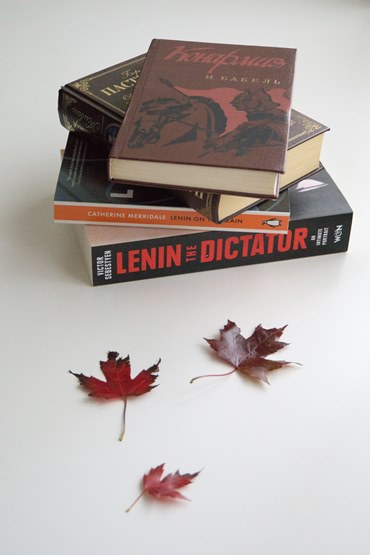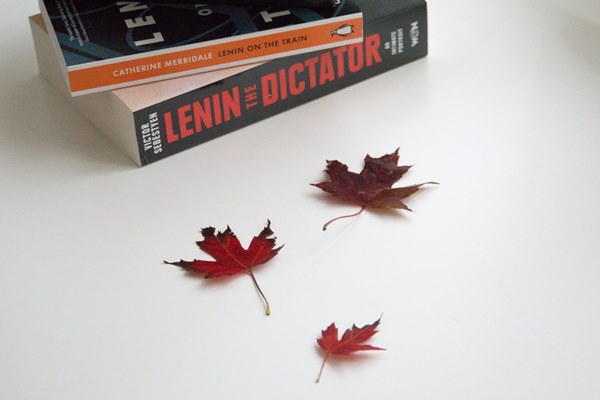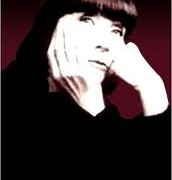My great-grandfather was a Bolshevik. Although he was too young to have participated in the events of the Revolution of 1917, he joined grass-roots Communist groups to spread literacy–and the word of Lenin. He was the first in his family to earn a university degree, and until his retirement he worked as a school teacher in central Ukraine. On the day marking the anniversary of the Bolshevik Revolution, November 7th, he donned the military honors he received during WWII and joined the parade.

Growing up in the Soviet Union, of which Ukraine was a part, I took the parades and processions for granted. I didn’t like them, because they felt perfunctory and empty of any meaning, but I participated, because refusing wasn’t an option. The older I got, the more I detested the slogans and the marches. “What did this revolution of yours achieve?” I would say to my great-grandfather whenever our discussions erupted into arguments. “Endless parades and endless lines?” The 1980s were a time of endemic shortages, when even basic goods like toilet paper disappeared from store shelves. When that happened, without a trace of irony we cut up the old issues of Pravda, the main Party newspaper whose name meant “Truth.” My great-grandfather was the only one who used it for its original intended purpose–reading the news.
Yet, for all his ardent belief in the revolution, my great-grandfather never romanticized it. I’m sure he would find the contemporary left’s nostalgia for a time they never experienced as deeply baffling. He might have thought that it was necessary to remove the corrupt, despotic tsarist system, but he recognized the tragedies it unleashed, especially the Civil War during which my great-grandfather lost much of his family. He was a believer and an idealist, but he wasn’t blind to the fact that the Red Revolution was followed by the Red Terror.
The Russian Revolution of 1917 was in fact not one but two revolutions. The first took place in February (March, according to the new style calendar), when the imperial government was overthrown, and the second in October (November), when led by Vladimir Lenin the Bolsheviks seized power. Once in control, the Bolsheviks abolished the first democratically elected parliament in Russian history, destroyed the opposition and installed what they called, “the dictatorship of the proletariat,” with all of the appropriate features.
I would no more celebrate the centenary of the Russian Revolution than the anniversary of the Cultural Revolution in China. Bolsheviks were a radical group that tried to bring by force the events that, according to their beliefs, were supposed to happen anyway. The result was one of the most devastating social experiments on a slice of humanity, and I experienced the tail end of it.
As this year marks the 100th anniversary of the Russian Revolution, I’d like to offer a reading list that highlights different aspects of it and the people that made it. We shouldn’t romanticize history but neither should we forget it. We should try to understand it.
Towards the Flame: Empire, War and the End of Tsarist Russia by Dominic Lieven
Dominic Lieven’s book is one of the best overviews of the events leading up to the Revolution. Even if the Bolshevik Revolution as such isn’t your topic, this brilliant account of the Russian empire in its dying days explains the subsequent developments of European history.
A People’s Tragedy: The Russian Revolution: 1891–1924 by Orlando Figes
One of the most thorough accounts of the Russian Revolution that considers it through the eyes of its makers as well as ordinary people. Figes explains why a revolution of such magnitude could only happen in Russia and also gives a sense of its calamitous effects on people, even those who might have benefitted from it. Since the book is ambitious, it’s been as much criticized as it was admired, but everyone who wants to understand the Russian Revolution should read it.
The book is one of the most complete tellings of the Russian Revolution, but at over 900 pages, it’s a daunting tome. Figes also has a condensed version titled Revolutionary Russia: A History, that looks at the Russian Revolution over the span of one hundred years, from 1891 to 1991. Also recommended.
Lenin the Dictator: An Intimate Portrait by Victor Sebestyen
Without Lenin, there would be no revolution. Germans knew well when they put him on a train back to Russia that returning from exile would destabilize the situation in a country. Except that the outcome wasn’t anything one could predict. Lenin pushed the Bolshevik party to seize the moment and to act decisively and ruthlessly. In his biography of the leader of the Russian Revolution, Sebestyen unravels many myths about Lenin, including his saintly aura that began to accompany him after his death in 1924. He points out that the goal of Lenin was not democratic politics–into which he didn’t put much credence–but the complete transformation of the state. As the Communist International anthem promised, “All of the world we will ruin by force in order to rebuild it again.”
Sebestyen also describes Lenin’s personal life and his personality, and although he doesn’t deny his sharp mind and vision, he doesn’t absolve Lenin of his mistakes and decisions that made the rise of Stalin possible.

Lenin on the Train by Catherine Merridale
Merridale’s account of how Lenin traveled in a ‘sealed train’ across Europe to return to Russia has a novelistic flair, but it’s grounded in solid research. Within a few weeks he would transform the political landscape in Russia, sending shock waves through the entire world, and lead the first Communist state.
Merridale explains how Lenin, realizing that the provisional government was floundering, exhorted the Bolsheviks to grab power. Through the country, the workers suffering the effects of the collapsing economy and protracted First World War, were becoming more and more radicalized, and the Bolshevik party found strong support among the grassroots. Though Merridale seems to be in awe of Lenin, her last chapter reminds the reader that the final destination of Lenin’s train was the gulag–not only for many who opposed the Bolsheviks but also for the first wave of Bolsheviks themselves.
The Dilemmas of Lenin by Tariq Ali
I understand that most people don’t need to read three biographies of Lenin, but I would be amiss if I didn’t include one sympathetic account of Lenin, and Tariq Ali’s is one of the best. I might take issue with his lighthearted comments that “Civil wars are never pretty affairs” to explain away Lenin’s fondness for ordering executions of his enemies and “enemies of the people,” but Ali brings solid research and interesting insights. Even if he excuses some of Lenin’s mistakes in a way that might make some take issue with his perspective, he nevertheless explains how Lenin created a dictatorship and build the very party that would assist Stalin. (Tariq Ali’s own reading list can be found here; our lists overlap only by a couple of titles, so please take a look.)
The Autobiography of a Sexually Emancipated Communist Woman by Alexandra Kollontai
Kollontai was the only female commissar and an important figure in the women’s liberation movement and is one of the most fascinating personas of her time. Her turn towards the Bolsheviks came when she witnessed the appalling conditions of female factory workers in the city and lost her faith in the ability of the provisional government to address the problems. She was an original thinker who believed in free love and communal arrangements, but who also recognized the importance of social services like affordable childcare to help women realize their talents and balance work and family responsibilities. Russia in the early 20th century was a patriarchal society, with misogynistic attitudes perpetuated not in a small part by the conservative Orthodox church. In this light, Kollontai’s idea that for women, as well as men, “sexuality is a human instinct as natural as hunger or thirst” was truly radical.
Although Kollontai had the support of Lenin and managed to influence the first Soviet constitution to give women much greater power than they had had in the entire history of Russia, she was obstructed as much by deeper societal prejudices as well as by other commissars who weren’t ready for Kollontai’s ideas. As she herself put it when she was appointed as ambassador to Norway, “When on occasion I am told that it is truly remarkable that a woman has been appointed to such a responsible position, I always think to myself that in the final analysis … what is of a wholly special significance here is that a woman, like myself, who has settled scores with the double standard and who has never concealed it, was accepted into a caste which to this very day staunchly upholds tradition and pseudo-morality.”
Doctor Zhivago by Boris Pasternak
“How wonderful to be alive, he thought. But why does it always hurt?”
Doctor Zhivago is a tragic love story set in post-revolutionary Russia, and it’s one of most poignant fictional works inspired by the Revolution. It follows the lives of Yuri Zhivago, a doctor who dreams of being a poet, Lara, his love and muse, and a complex cast of supporting characters. This is a novel to read for the atmosphere of the times, because Pasternak’s pen brings up all of the turbulence and violence of the period–the exhilaration of the revolution, the brutality of the Civil War and purges, and the desperation of poverty. Pasternak received the Nobel Prize for the novel in 1958, but even though he declined it, the Soviet government pronounced him a traitor and expelled him from the writers’ union. Pasternak died two years later.
Pasternak’s language, rich, poetic, vivid, makes him one of the most impressive stylists in a pantheon filled with the likes of Chekhov, Bunin, Tsvetaeva, and Tolstoy. If you’re reading in English and want to experience some of the explosive effects of his work, try the translation by Max Hayward and Manya Harari. It dates to 1958, but it’s still the best one.
The Foundation Pit by Andrei Platonov
“Anyone in whose trousers lies the Party’s card must ceaselessly take care that there should be enthusiasm in his body. So I challenge you, comrade Voschev, to join in socialist competition for the highest happiness of mood!”
A socialist dystopia with a sharp critique of the inhumane collectivization process, the Foundation Pit was written in the 1930s, but it wasn’t published in Russia until 1987. The story revolved about a group of workers digging a pit for the building that will house the future proletariat. Voschev, the protagonist of the novel, joins the workers after he has been fired from the machine factory due to his tendency to fall deep in thought. “What if we all get lost in thought — who’ll be left to act?” says the management to him. As Voschev works at the foundation pit, he realizes that instead of building a new house, he’s digging a grave.
The NYRB Classics edition translated into English by Robert and Elizabeth Chandler and Olga Meerson takes the most complete Russian text of the novel. The older translations, such as that by Mirra Ginsburg and Thomas Whitney, were based on censored versions.
The House of Government: A Saga of the Russian Revolution by Yuri Slezkine
If the Communist house in Foundation Pit is fiction, The House of Government was real. It was a building on Bolotnaya Square across from the Kremlin intended for senior government workers. Slezkine traces the fate of its residents. The first part of the book gives the historical context and explains the rise of the Bolshevik party and the events of the October Revolution. The building itself is the main character of the story, and Slezkine’s story is absorbing. The publisher compares it to Tolstoy’s War and Peace, Grossman’s Life and Fate and Solzhenitsyn’s The Gulag Archipelago, and I would agree. There is the same epic and ambitious perspective to the book, and while it’s a hefty volume of over 1000 pages, it’s an absorbing read. ‘Why did Bolshevism die after one generation?’ Slezkine asks, and through the stories that make up the House of Government he explains.
Red Cavalry by Isaac Babel
“The orange sun is rolling across the sky like a severed head, gentle light glimmers in the ravines among the clouds, the banners of the sunset are fluttering above our heads. The stench of yesterday’s blood and slaughtered horses drips into the evening chill.”
Isaac Babel was born in Odessa, a city in the southern Ukraine that gave him many colorful subjects and rich language. However, his masterpiece was born during his journalistic assignment in the Civil War that broke out in the immediate post-Revolution years. Although it’s often called the Russian Civil War, much of it was fought on the territory of Ukraine, and Babel’s stories describe the suffering, violence and moral decay of those years. As Jorge Luis Borges wrote of Red Cavalry, “The music of its style contrasts with the almost ineffable brutality of certain scenes.” Isaac Babel fell victim to the same brutality as he was arrested and shot in 1940 on the order of Stalin.
April Theses by Vladimir Lenin
Finally, should you want to go to the source, consider April Theses by the architect of the revolution himself. Whatever your thoughts on Lenin’s political agenda, his trenchant, sharp style can be quite entertaining. “Mr. Plekhanov in his paper called my speech “raving”. Very good, Mr. Plekhanov! But look how awkward, uncouth and slow-witted you are in your polemics. If I delivered a raving speech for two hours, how is it that an audience of hundreds tolerated this “raving”? Further, why does your paper devote a whole column to an account of the “raving”? Inconsistent, highly inconsistent!”
As always, please share your reading lists. They’re always inspiring.
Photography by Bois de Jasmin
















74 Comments
Danaki: Thank you Victoria for this informative post. For a few years, and before the Arab Spring, I’ve been reading some (though very few) books that critique Arab Nationalism – which was strongly supported by the USSR.
I’m equally baffled by those who romanticize the days of Abdel Nasr (he too took to removing many journalists and revolutionaries from their jobs, jailing most of them and executing quite a few).
What also baffles me is the binary view many left-wing people in Europe hold, which leads the to sometimes defending e.g. the regimes in Syria and the like.
So thank you very much for the reading list. That’s my Christmas break sorted. Currently knee-deep in marking my students’ midterm assignments. October 30, 2017 at 8:00am
Victoria: The centenary of the revolution definitely brought lots of books, and some of them are distinctly of the romantic variety that’s ready to forgive Bolsheviks everything. Anyway, out of the books I read I picked the ones that present the October Revolution from different viewpoints. There are some excellent publications.
Yes, believe me, that baffles me too. But then again, people like Sartre and de Beauvoir chose to overlook and excuse the excess of the Stalinist era, so that’s nothing new. Past Imperfect by Tony Judt is a very good book covering this very topic. October 30, 2017 at 9:23am
Austenfan: Interestingly Camus was never fooled, and I don’t believe he had access to more information than Sartre and De Beauvoir. October 30, 2017 at 10:55am
Maya: This past Sunday, here in NYC, I saw a woman walk by with a tote bag with the inscription 1917-2017. I commented to my husband that I find it disgusting given the millions who perished. Incidentally, I just ordered The Reckless Mind:Intellectuals in Politics that examines the issue of intellectuals and the lure they find in less than savory politicians and ideologies. As always, thanks for the enlightening reviews and recommendations. October 30, 2017 at 3:50pm
Victoria: Yes, trivializing in the worst way. Reminds me of Serge Lutens emblazing his bottles with the hammer and sickle. October 30, 2017 at 4:30pm
Victoria: That’s true. And André Gide also saw through the Potemkin villages on his visit to the USSR (the only one out of the group who did). Have you read his Retour de l’U.R.S.S.? Written in 1936. October 30, 2017 at 4:25pm
Maya: Not aware- will look into it. Thank you again. October 30, 2017 at 4:30pm
Austenfan: No, I haven’t although I know it exists. October 30, 2017 at 5:27pm
Victoria: He traveled to the USSR with a group of other French Communists, and he was the only one (!) who saw the falsity and pretense. Many others either wanted to hold onto an ideal or were under the peer pressure not to say anything negative. October 31, 2017 at 11:56am
Isabella: Very good list. Slezkin work is particularly outstanding .
I would also recommend Nabokov’s the Other shores’ it is not only about the the revolution of course, but one can see the repercussions that revolution brought to so many Russians .
There is a whole wealth of autobiographies on that subject . Not sure if Bunin’s ‘ Окаянные дни’ – ‘ Cursed days ‘ was translated in to English. That is an outstanding witnes account from the great Russian writer.
The left intelligentsia should hang their heads in shame, for supporting and sympathising with communist dictatorships in former USSR , Cuba and elsewhere .
‘ May 27, 2019 at 11:06am
Elise: I know this first-hand. I should have been smarter: I am a Spanish speaker. Part of my college coursework involved 20th Century Latin American history (including the Dirty Wars and dictatorships). My own dad was often in Latin America and spoke about feeling “safe, even at 2am”. And yet…it took years to accept the terror that resulted in “safe” streets.
So while it feels good to be colleagues with Sartre and de Beauvoir, none of us were particularly intelligent about fascism, and I am glad that I eventually learned differently.
Still…I am glad that my dad was safe during his business travels in the 1980s. But the price, and the feelings of other daughters missing their own fathers because they disappeared, make it a poison relief. November 1, 2017 at 12:58pm
Victoria: Judging by the political landscape today, not many lessons about fascism stuck either.
Glad that your father was safe. November 3, 2017 at 12:31pm
Elise: Which proves your point that this history must must must be taught and digested and discussed.
Yes, I am glad that my dad was safe–and thank you for your sentiments…but I know that the streets were ostensibly safe because other daughters lost their fathers to death squads in Chile and Argentina. November 3, 2017 at 7:08pm
Gina: More books to add to Goodreads! Very interesting list. Did you ever read Orest Subtelny’s Ukraine: A History. It goes from Kievan Rus up to modern times. A definitive work. I own it. October 30, 2017 at 10:05am
Victoria: I haven’t read it in full, but it’s well-researched. I also like Sergy Plokhy’s The Gates of Europe for a more digestible and well-written version. October 30, 2017 at 4:31pm
Hypnotist Collector: Thank you for this post! My grandfather came from what is now Ukraine; he was a young teenager who ran with a group of idealistic anarchists (his term) in the revolution. He stole a printing press so they could print flyers for meetings, and went to jail. I have his manuscript telling his story. He was released for his youth, and came to America. October 30, 2017 at 10:09am
Victoria: Lucky for him! These were the very people killed by Stalin. October 30, 2017 at 4:32pm
Hypnotist Collector: Yes, I believe his youth saved him – he was just 14 when he was arrested. Thank you for this list. Dr. Zhivago is one of my favorite films of all time — but I have never read the book. I’ll look for the translation you recommend. October 30, 2017 at 4:59pm
Victoria: I also saw the film first, but the book is even better. As I read, however, I did see Lara and Yuri as Julie Christie and Omar Sharif! October 30, 2017 at 5:12pm
Eudora: Same here, I watched the movie and then read the book with gorgeous Julie Christie and amazed Omar Sharif in my mind. Unforgetable actuations. The film focuses, obviously, in the love affair but it is a wonderful adaptation and it is so moving… And the music, and the snow, and Omar Sharif’s eyes…
Thanks for your insights and the recommendations Victoria. October 31, 2017 at 3:40am
Victoria: And the dreamy look in those eyes. I remember watching an interview with Sharif and he explained how he trained for the role. That included waxing his forehead to achieve the higher hairline! October 31, 2017 at 12:07pm
Victoria: Here is an excerpt from that interview:
https://www.youtube.com/watch?v=dqr7d-OLPXI November 1, 2017 at 2:57am
Austenfan: Thanks for these tips. I’ve read Figes’ Natasha’s dance and The Whisperers. Apart from the books being very informative, he is such a good storyteller. I haven’t read this book though so I will buy it. October 30, 2017 at 11:19am
Victoria: Figes is very strong on the national character discourse, which sometimes can test my patience, but I do like his books, and Natasha’s Dance despite its length is an easy read. His book on the Revolution is likewise told through stories. Either book I mentioned is good, so it just depends how much time you want to devote to this topic. October 30, 2017 at 4:35pm
Austenfan: Ever since doing 2 years of Russian, and actually even before that, I’ve been fascinated by Russian history, probably because it’s so unlike Dutch history. I’ve read a few books by Conquest, the two Figes and I think some others.
Anyway, I’ll save this list, as for once I’m quite likely to read at least some of it. Also it’s so interesting to get your perspective on it, and I always love to hear about your great-grandfather. October 30, 2017 at 5:26pm
Victoria: Conquest’s are very good books.
By the way, not directly related to the revolution, but “Physics in a Mad World” is a story of three different scientists in the USSR. Reading it one realizes that science fiction or dystopias have nothing on reality. October 31, 2017 at 11:54am
Austenfan: I’m making a note for that one as well. The first book by Conquest I read was his account of Kolyma, which I found because of reading Varlam Shalamov’s haunting account of the time he spent there. November 1, 2017 at 2:18pm
Victoria: I read Shalamov’s book in full not that long ago, and yes, it also made me want to read Conquest’s. November 3, 2017 at 12:35pm
Isabella: Very good list. Slezkin work is particularly outstanding .
I would also recommend Nabokov’s the Other shores’ it is not only about the the revolution of course, but one can see the repercussions that revolution brought to so many Russians .
There is a whole wealth of autobiographies on that subject . Not sure if Bunin’s ‘ Окаянные дни’ – ‘ Cursed days ‘ was translated in to English. That is an outstanding witnes account from the great Russian writer.
The left intelligentsia should hang their heads in shame, for supporting and sympathising with communist dictatorships in former USSR , Cuba and elsewhere .
‘ May 27, 2019 at 10:57am
Becky K.: Thank you for sharing this reading list, along with your experiences. It made me think of a book I read a few months ago, “Russia and the Western Man” by Dr. Walter Schubart. It was translated in 1950 based on an original transcript from 1938. Although it has a tendency to over-generalize large groups of people, it gave me a better understanding of world history. Even though I am from the United States, I identified more with his version of the Slavic soul, yet I am not aware of any Slavic history in my family. I wonder if anyone else has read this book recently. October 30, 2017 at 11:38am
Victoria: Thank you, Becky. I haven’t read it.
Sometimes we feel affinities to people or places that have no logical explanation. Ever since I was a child, for instance, I was fascinated by India, Iran and Japan. More important is just to follow one’s curiosity and see where it takes you. October 30, 2017 at 4:37pm
Cornelia Blimber: I admire the way you present this list, giving an excellent résumé of each book. October 30, 2017 at 11:43am
Victoria: Thank you very much! October 30, 2017 at 4:38pm
Geraldine Ethen: It is so important to understand the complexities of history. Thank you for this list, Victoria. I appreciate your comments about each book, and about how the events of the day impacted your forebears. At this point, the only book I’ve read is Dr. Zhivago, a masterpiece. October 30, 2017 at 11:54am
Victoria: Thank you!
It took me a long time to read Dr. Zhivago, because I knew Pasternak as a poet first and couldn’t make a transition to his prose. He’s not as great at developing characters, but the way he captured the aura of the times is incredibly rich. There are a few passages I remember by heart because of their beautiful language. October 30, 2017 at 4:41pm
Eudora: For me Dr Zhivago, the book, what I won’t forget, is “the train”, which is a Russian theme in itself. October 31, 2017 at 3:44am
Victoria: The train theme is important. It also figures in the works of many Russian authors such as Chekhov and Tolstoy (Anna Karenina, of course). October 31, 2017 at 12:08pm
Hypnotist Collector: And makes me think of Al Stewart’s excellent song “Roads to Moscow” although it’s about WWII rather than 1917. October 31, 2017 at 12:53pm
Victoria: I don’t remember it, so I’m off to find it. November 1, 2017 at 2:56am
spe: My father’s family fled the Ukraine – to Canada – a few years prior to the Bolshevik Revolution.
I am forever grateful.
Thank you for this wonderfully curated book list. October 30, 2017 at 11:57am
Victoria: Yes, very lucky. The worst years in Ukraine were just after the Revolution, because there was little popular support for the Bolsheviks (people like my grandfather were in a minority), and the struggle for power was bloody. The town where my mom’s side lives was retaken more than a dozen times. It was utter mayhem. October 30, 2017 at 4:45pm
Carla: I haven’t read your book reviews yet but your intro is excellent Victoria! October 30, 2017 at 1:05pm
Victoria: Thank you, Carla! October 30, 2017 at 4:45pm
Mel: Years ago I read “Passage Through Armageddon” which is an extremely lively account of the Revolution. There’s also John Reed’s “Ten Days that Shook the World.” A fascinating period of history. I always thought of Nicholas II as a wimp, so if you didn’t know his constitutional weakness or naivete and read that he was despotic, you would imagine a cruel or threatening character. In fact, he was deeply in love with his wife which was an arranged marriage, and born into circumstances he was completely unfit for. October 30, 2017 at 3:28pm
Victoria: John Reed’s Ten Days that Shook the World is a classic, but probably not the most objective account. Lenin endorsed it. Stalin banned it. Still, it should be on the list.
Not Nicholas II, it was the tsarist system itself that was despotic. In fact, some of the worst abuses of power perpetuated by the Bolsheviks drew up on the extensive police state apparatus created and refined earlier. The problem of Nicholas was that he was oblivious to whatever was happening in the country, and as you say, not capable of handling the situation. And then it was too late… October 30, 2017 at 4:58pm
Mel: Wondering what you think of the movie “Reds” by Warren Beatty…? October 30, 2017 at 5:05pm
Victoria: I haven’t seen it. October 30, 2017 at 5:14pm
Tara C: I loved it and found it fascinating, as I was only vaguely aware of the Russian revolution at that point in my life. October 31, 2017 at 12:10pm
Victoria: Putting it onto my list! November 1, 2017 at 2:58am
Mia: Thank you, Victoria! Such an important reflection of your own and your family history intertwined with so huge and complex historical turns. For Finns the Revolution happened to turn into independence from the Russian rule – thus “celebrating” the same amount of years as a nation. At these times, however, I do not care too much about the glorified nationalism. Anyway, utmost important to understand the historical trajectories. I think I will pick up Kollontai! October 30, 2017 at 3:33pm
Victoria: Kollontai, in fact, was of the mixed Ukrainian, Russian and Finnish background and lived in Finland at one point. Anyway, she’s a fascinating character. October 30, 2017 at 5:05pm
Mia: She is a fascinating character. True, I did not remember her background having been that multicultural! No wonder she was also able to act as a negotiator also in the later wars. October 31, 2017 at 12:22am
Victoria: She was sidelined after Lenin’s death, though. But even Lenin wasn’t prepared for the kind of changes she was proposing. October 31, 2017 at 11:57am
Jillie: An excellent list, Victoria, and as I was reading it I was wondering what you would have made of Dr Zhivago and then there it was!
I feel so sad thinking about this and all revolutions – the loss of life and utter misery replacing the loss of life and utter misery that existed before. We trust that future generations will learn from past mistakes and that by having removed tyrants and despots there will be a better existence for the people. But the world repeats the wrongs and is stuck in a cycle. George Orwell summed it up so well in Animal Farm – “All animals are equal, only some are more equal than others”.
We always have hope, though. And intelligent people who try to make a difference. October 31, 2017 at 1:49am
Victoria: Some people benefited from the October Revolution, of course, and there were some positive changes. For instance, literacy and education. The Russian Empire had 20% literacy rate (and maybe half that for women) at the turn of the 20th century and by the 30s literacy was near universal. But overall, the years following the revolution were bloody and harrowing. I rather agree with Figes’s assessment. October 31, 2017 at 12:06pm
Satsukibare: Wonderful bibliography Victoria: your touch is light, yet you manage to convey an eternity of suffering that your family, like so many others, endured and survived. Alexandra Kollontai’s memoir goes straight onto my to-read list. October 31, 2017 at 8:05am
Victoria: I hope that you like it. I read it in Russian, but from the few excerpts I’ve seen in other books, the English translation captures her vivid, sharp writing style. October 31, 2017 at 12:09pm
Elise: Important column. And I would like some advice. As another said said: your touch is light, but you manage to convey the suffering. And another talked about the need to learn.
How to honor and learn from the past when a person is so overcome by grief, that they cannot read further. I read about the Holomodor, but suffered so many nightmares that I placed a moratorium on reading further about 20th-century Eastern and Central Europe. It is more than just discomfort…
So the problem for me–and probably many others so this is a public question–how can you toughen up enough to read about this? November 1, 2017 at 1:43pm
Victoria: I don’t have a good answer it. I also find this topic very difficult, and reading more about it doesn’t make it easier. But it’s important to know. That’s my main motivation. Millions people lived and suffered through the tragic historical events, and the least I can do to honor and remember them is to read about it. November 3, 2017 at 12:34pm
Elise: Thank you for your reply. Yes, it is difficult, and it feels so dumb to wave away interest in an entire region. But we must keep reading and honoring. But man…I get nightmares and bad flashbacks from my own past. (Amazing what Borderline mothers can do to a child…and my mother caused hardly the worst damage I have heard of)
As a mental health therapist, I like to think that my work helping others overcome their trauma honors those who died and were hurt by fascism and oligarchy and prevents other hurt children from growing up into monsters.
But I am unsatisfied by my response. Not only does it sublimate 20th-century horror, but it is also quite racist: I am effectively refusing to read anything about 20th-century Eastern or Central Europe because I am too scared of the flashbacks. Even if someone I respect has her feelings hurt.
GAH! Again, making this public because maybe others feel similarly, and we can work through this problem together. November 3, 2017 at 7:16pm
Victoria: I don’t think that it’s racist at all! Holodomor, for instance is a difficult topic, and there are plenty of Ukrainians who would find reading about it very difficult. And then, there are plenty of excellent books about the 20th century Eastern Europe that give you an idea of its history and keep things in perspective. Ukraine is not only bloodlands, after all. It’s also a vibrant place, with fascinating, rich culture (that I should add, survived despite it all), delicious cuisine and more high-spirited people than one would imagine by reading only the books about the famines and wars. I should make a separate list, but a book I often recommend is Red Prince by Timothy Snyder. November 4, 2017 at 11:20am
Elise: Thank you for your considered answer! First up, I must gently correct you: It is certainly racist to wipe away interest in an entire 20th century history of a heterogeneous swath of continent because I am not strong enough to work through history of one area during one decade. It is just as racist as assuming that everyone in Eastern and Central Europe eat borscht or potatoes at every meal and are grim and any other racist stereotype from the (heterogeneous) area.
Since your column has always been one of gentleness, I assume that you saw my genuine desire to know more and to be open and kind. I do! I am sure that many others do, as well.
Maybe you hit on the solution: Asking people from various countries–and who know of my proclivities to flashbacks and nightmares–to suggest sources. If they have been open to sharing ideas in the past, of course.
So it would be wonderful to have a separate list of the proud parts of your heritage–similar to the food columns from your grandmother!
Your book is on my wishlist. Thank you. November 4, 2017 at 8:01pm
Sapphire: I don’t know if I could ever get around to all the books about the Russian revolution, but I do have an old copy of Dr. Zhivago that I will read someday. I checked on the translation and am excited it was the one you prefer, Victoria. November 2, 2017 at 11:06am
Victoria: Ah, great! That one is the best. I had to compare the two for a friend and I find the older translation superior. November 3, 2017 at 12:36pm
Toni: What great selections. Thank you.
On a lighter note, I came across an English copy of The Firebird & Other Russian Fairy Tales with beautiful illustrations by Boris Zvorykin.
The introduction by Jacqueline Onassis gave me the background I needed to truly appreciate the fairy tales you probably grew up with. November 3, 2017 at 8:27pm
Victoria: I had a book with the illustrations by Bilibin, who is one of the most famous artists. I can’t think of Baba Yaga and the Firebird without seeing his images in my mind. November 4, 2017 at 11:21am
Aurora: Wonderful bibliography with so much food for thought on the October revolution. Thank you, Victoria. November 9, 2017 at 7:46am
Victoria: You’re most welcome! November 10, 2017 at 9:00am
Christine M: Very good description of the reality of the revolution and imposition of misery on millions for 70 years Victoria and a reminder to those in blissful ignorance who see it and Lenin in a very foolish romantic light today. I appreciate your blog very much. November 22, 2017 at 4:51pm
Karen Taylor: The Family Romanov: Murder, Rebellion, and the Fall of Imperial Russia – I just read this – it is YA nonfiction and won some awards so it is an easier read but I couldn’t put it down. I am ready for your recommendations – thanks for all you do! January 4, 2018 at 12:43pm
Aisha: I was wondering whether Doctor Zhivago would make your list. I absolutely loved that book when I read it for the first time earlier this year. I’ll have to check out some of the other ones you’ve listed. April 24, 2018 at 8:29pm
Victoria: Yes, definitely! It was one of the few fictionalized accounts of the Revolution by someone who lived through it. And then, Pasternak’s style is to be experienced. April 26, 2018 at 8:58am
MaryAnn Popper Hardy: THANK YOU very much for the suggested books! My husband has been intensely smitten with Russian history in this time period (I have sat with him to watch “Dr. Zhivago” for the entire 24 years we’ve been together! And of course he has read that book. I have agreed to only mutter ONCE about the infidelity, and then we go on enjoying the film.
I have checked into Amazon and just now purchased a hardback copy of “Towards the Flame: Empire, War and the End of Tsarist Russia” by Dominic Lieven.
I will search out “A People’s Tragedy: The Russian Revolution: 1891–1924 by Orlando Figes” and then present the books to him.
Thank you for everything you do to share your knowledge, enthusiasm, passion, and wisdom with us. I’ve learned a great deal from your blog. (Before the internet, I had NO idea that there were common people (your blog followers) who loved fragrance, were fascinated with smells, and cherished certain scents. I HOPE you feel appreciated 🙂
All best wishes,
MaryAnn
(on Vancouver Island, the Pacific Northwest) September 16, 2021 at 4:59pm
Victoria: Thank you very much, MaryAnn! I’m so glad that you found the list interesting. September 18, 2021 at 8:34am